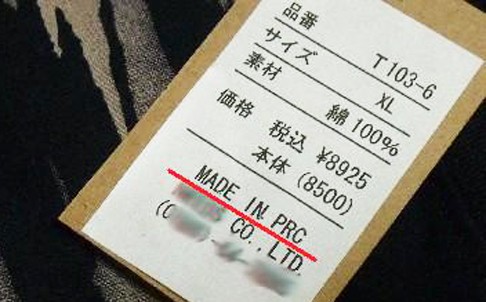What's in a label? Chinese firms try to cover origins of clothing in Japan
PUBLISHED : Tuesday, 06 January, 2015, 1:28am
UPDATED : Tuesday, 06 January, 2015, 1:28am
Julian Ryall in Tokyo

Is this piece of clothing still worth almost 9,000 yen (US$74) if you knew it was made in China? Photo: Seesaa blogs
Japan's consumer watchdog has said it is powerless to stop Chinese firms stitching labels that read "Made in PRC" in clothing bound for the Japanese market, even though many local consumers do not understand that the acronym means the product was made in China.
Many products that originate in the Peoples' Republic of China do not have the best of reputations in a country that expects a high degree of quality, but where consumers are increasingly looking to pay less.
Ill-feelings towards Japan's near neighbour and regional economic rival have been heightened by rows over the sovereignty of islands in the East China Sea and different perceptions of the two nations' shared history.
A study in October by Genron, a Tokyo-based nonprofit organisation, indicated that a record 93 per cent of Japanese have a negative impression of China, up from 90 per cent one year earlier.
Chinese clothing firms have apparently realised that identifying the source of their products is harming sales in Japan.
A spokesman for The Consumer Affairs Agency of Japan was unable to answer questions from The South China Morning Post, but the agency previously told the Sankei Shimbun newspaper that there are no rules that forbid Chinese clothing firms from using labels marked "Made in PRC."
It said, however, that Japanese consumers have a "low degree of familiarity" with the term.
The Japanese clothing industry has responded to the challenge by announcing plans to add a new tag to all domestically produced apparel stating that it is "genuine" made-in-Japan.
The trade and industry ministry is assisting in the programme, which is designed to show that while Japanese-made clothing is more expensive than imports from abroad, primarily due to high labour costs, the quality of the finished products is far superior.
The new "J Quality" tags will be attached to suits, shirts and sweaters where the weaving, dyeing and sewing processes have all been carried out in Japan, the Yomiuri newspaper reported.
